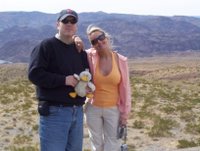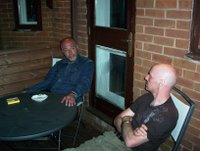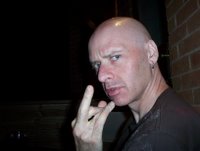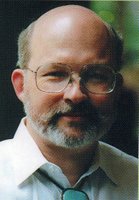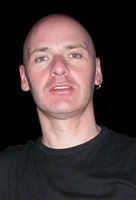When I was in the United Kingdom in early June, I had the chance to get to know Stuart Miller, the Publisher of the
Zorgy Award-winning on-line ‘zine
UFO Review. Stuart makes a great cup of tea (or sometimes a vat, if he’s using one of his super-sized cups), he probably knows more about motorcycles than anyone in ufology, he has a lovely family, a very friendly dog named Molly, and he enjoys his stogies. He is articulate, knowledgeable, and opinionated, which always makes for a good interview.
If I have a problem with Stuart, it’s that he's too modest (all of it genuine) about his own role in ufology.
UFO Review is one of the best places to go for a comprehensive summary of the news of the day in the world of the paranormal, and his bi-monthly e-zine of the same name, which usually exceeds a hundred pages of content, is a must-read. His monthly UK reports on the
Strange Days… Indeed radio show are always a good listen, and he’s to be commended for having the guts to put on a UFO conference at a time when attendance for conferences is down across the board. In short, he’s an important person within ufology, and makes, in his own way, a very significant and worthwhile contribution.
I sat down with him at his home near Altrincham (where my DOP Findlay Muir and I stayed for three days – did I mention Stuart was extremely generous, as well??), a camera, some videotape, his stogies, and Molly (his dog), for a chat about UFOs and ufology on Monday, June 12th, just before I left for London.
Paul Kimball
The Other Side of… Stuart MillerQ. There often seems to be, if not quite a rift, then at least some significant differences, between British ufology and American ufology. Is that true, and, if so, what are those differences?A. British ufology is very different than American ufology. We tend by nature to be a bit more sceptical. We shout less, I guess, to put it bluntly. There are considerably less abduction cases. There are considerably less cases to do with cryptozoology. There are certainly a large number of good sighting reports in the UK, and of course the UK is generally a very strange area. Beyond that – I always hate using this word, but I think what differences you might find between British ufology and American ufology come down to culture.
Q. Is Rendlesham the best UFO case in England’s history?A. It is England’s best. After twenty-five years, every single kind of expert looking at it, the consensus still is something very weird happened there. That’s about as far as anybody can go. As to exactly what happened there, nobody knows. You get varying opinions, but really all the sceptical theories gradually been discounted over the years. The most common one was the lighthouse, that they mistook the lights for the lighthouse – that’s gone now. That’s it. Beyond that you can’t really say much more. I’m sure somebody knows, somewhere.
Q. What do you think it was?A. I think there’s a chance that it fits into the general genre of the paranormal. Rendlesham itself has an extremely long history, going back hundreds of years, of strange, paranormal events in the forest. So, in 1980, you get what seems to be a UFO landing. Is there a higher intelligence that is presenting itself in a manner, in a style, in a fashion, which was acceptable to us in the 1980s, as it was then, or was it a nuts and bolts craft? It’s very difficult to say, one way or another. I think the history of the area is relevant, and pertinent – there is, as I say, a very long history of strange sightings in and around that area.
Q. Talk a bit about the various theories there are to explain the UFO phenomenon. What do you make of them?A. I find that my opinions are like shifting sands – they seem to vary, not necessarily on a week to week basis, but they change. I’m quite influenced by what I read and what I hear. For some considerable time I’ve tended towards the Vallee-ian / Keel-ian philosophy, which is that it’s a paranormal event.
What I’d like it to be are humanoid beings of superior intelligence from another planet, not ultras. I’d like, ideally, the "space brothers" to be the reality.
My suspicion is that it’s paranormal. I’ve come to the conclusion over the last year or two years that it’s all roped together, that there is something happening out there – that ghosts, and fairies, and UFOs, are probably, in some way, linked together, and there is an intelligence that chooses to play with us, for whatever reason.
Q. Okay, so what about the Extraterrestrial hypothesis?A. It is as perfectly a valid theory as anything else, and some might argue that it is the pre-eminent theory, based on evidence, and I would have no problem with that. It is the theory I would prefer of choice. It’s not the one that I necessarily think is the reality, but I have no problems with it. I respect it. Yes, obviously there are different shades of belief, some people take it to a point that is perhaps a bit unrealistic, or more unrealistic than anything else, but I’m perfectly comfortable with it, and would be very happy if we ever find that it was the solution to the problem.
Q. Where does that leave abductions?A. Well, it’s now generally accepted folklore that there’s a strong chance that five hundred years ago when people were seeing fairies, and someone was taken off to see the fairie Queen, and was forced to have sex with here for two days, you can transfer that to modern-day abductions. Again, you come back to the same point – if there is a greater intelligence out there, an intangible thing, is it manifesting itself, is it presenting itself, in a culturally accepted manner to us in our present day and time?
Q. What about ufology? Where is it today, compared to where it’s been, and where do you see it heading in the future?A. The obvious major difference between now and the "glory days" in the ‘50s, ‘60s, ‘ 70s and the ‘80s, is the Internet. It’s had a very profound effect on ufology, in the way the cases are investigated, and the way that the cases are reported. It’s made the subject much more available to the public. Is that a good thing, or is it a bad thing? I guess it’s got its pros and cons, but I would say on balance it’s a positive thing. In terms of how it’s going to go, it depends on the level of interest that’s maintained in the subject by people.
I think ufology today is less exciting than it was thirty years ago, but I think it’s more grounded and practical today. Thirty years ago, forty years ago, even twenty years ago, there was an element of excitement in it because the subject was of interest to intelligence agencies, and they injected an element of interest in it even if it was misdirection, misinformation, and so on. That seems to have departed the subject now, which might be a statement about the relevance of ufology as seen by various governments.
People obviously are still looking for answers, and the New Age movement has developed significantly as well, which many people see as detracting from ufology, or confusing the subject more.
I don’t know where it’s going to go. It’s vulnerable to external influences. If you get a TV program again that captures the public imagination like the X-Files did, or if there is some kind of major development, either negative or positive in relation to ufology, which will effect the general public’s interest, then suddenly there will be a groundswell of people coming in.
I think the background behind it has changed subtly as well. I think there is a more serious acceptance of ufology, or intelligent extraterrestrial life elsewhere. People tend to laugh less at ufology – if anything, ufology is becoming more serious, so the boundaries are getting blurred or fuzzy, but where it’s going to go, I have no instinct for that.
Q. Does science have a role to play in the study of the UFO phenomenon?A. I have very, very mixed views about the relevance of science to ufology. On the one hand, if there is a belief that the answer lies in, for example, natural phenomena that we are currently unaware of or know very little about, then obviously science has a role there. If there is a belief that the answer to the problem lies in the paranormal, then science is wasting its time.
I personally have a lot of resentment towards the scientific community in terms of the way that ufology has been viewed, treated, dealt with, and there is a knee-jerk reaction on my part to say, "well, science hasn’t been truly bothered in the past, do we really need it, would we move on if science took a greater interest?"
We’ve just had the Condign Report with a scientific edge to it, and all that’s done is produce a host of laughs everywhere.
I think on balance I’d say, "yeah, let science get stuck in," because it would just keep those people within ufology that constantly go on about the relevance of science – it would finally shut them up, and I’d like to shut them up, frankly. [Laughs] I don’t believe the answer lies there, personally.
Q. You mentioned the Condign report. Do you think it was important, and, if so, how and why?A. Yes, the Condign Report is very important, there’s no question about it, if only for the fact that a major Western government was prepared to spend, not a great deal of money but, nevertheless, a fair bit of money, on investigating the subject. In other words, in the mid to late 1990s the subject of ufology was still driving the Ministry of Defence absolutely bonkers, sufficiently enough for them to get off their backsides and do something about it.
The Report itself has one or two interesting insights into the way that the Ministry of Defence thinks about UFOs, and what little is given away about Russia and America in there as well is also interesting. The science, though, has been largely, profoundly, discounted.
Q. What about the reaction to the Condign Report within ufology?A. Well, it has to be said there was a bit of panic at the thought of this report coming out amongst some people. A government investigation with the implication that because it was the government it had access to better facilities, etc., and that it might produce a non-ETH solution, I think did worry a lot of people. I think that ufology has taken it very much in its step and perhaps not actually given it enough credit, or the credit that it justifies. The fact that it’s been done by the British government doesn’t seem to have made much of an impact. Obviously, Condign wasn’t up to the standard of Condon or Blue Book, so I think people have largely written it off.
Q. One last question before the short-snapper, name-association round. You’ve applied the term "fascist" to some people in ufology. Why?A. I first used the word "fascist" in relation to ufology because I came across somebody who wanted to dictate to the general public what they could or could not see by way of a ufological conference. This particular gentleman was profoundly against the theories and ideologies that were going to be presented at this conference, so much so that if he had the power he would have stopped the conference from going ahead, and I thought that was absolutely ridiculous. If we’re moving into that area then we might as well just pack up. It’s ridiculous, but that’s what happens in ufology, you know – people get themselves into certain positions, and, well, there’s an immense snobbery in ufology. It’s a killer, that. There’s so much condescension there, with people looking down on other people’s beliefs, and theories. As I said, it’s ridiculous.
It adds to the beauty of the subject, the fact that there is such an enormous variety of opinion and belief, for want of a better term. That irritates a lot of people who consider that it besmirches the name of ufology if you’ve got crackpot people with crackpot theories and so on, but the bottom line is that as nobody knows the answer, some of us could be in for a nasty surprise eventually if we discover the truth and find that the reality is… [he pauses]… vague. [Laughs]
Q. And now, drum roll please, the short snapper, name association game.Stan Friedman.A. The Godfather of ufology. Regardless of what you think of Stan’s philosophies, without him ufology would be a very, very different subject. I think you could say that he’s probably made the biggest contribution to the subject that anyone has made, more so than Jim McDonald, even.
Q. Errol Bruce-Knapp.A. In his own way, has also made an extremely significant contribution to the subject, in providing an intelligent forum for intelligent people to discuss the subject. Take UFO Updates away and… well, I don’t want to imagine the concept of UFO Updates not being there. Again, ufology would be very, very different. There is nothing that comes anywhere close to it.
Q. Nick Pope.A. Nick attracts a lot of criticism in the UK, and I can understand where a lot of that criticism comes from. I think some of it is based in jealousy, some of it is based on the belief that Nick has made, or supposedly made, grander claims for his role at the MOD than the reality seems to bear out. I think, actually, that he’s a very valuable asset to British ufology. There’s no question he is the "masthead" in the UK for the subject. He’s the go-to person that the media turn to straight away when they need somebody to speak about something. Does he represent it well? Yes. The guy is okay.
Q. Dick Hall.A. Dick’s been there right from the start. I’m envious of him in many ways, because he experienced many of the major cases at the time they happened, and I would have loved to have done that. You stay in the subject for as long as Dick has, and your life begins to wind down, and it must be very frustrating not having an answer. After fifty years, I wonder how I’m going to feel should I be fortunate enough to get to Dick’s age if the situation then is at it is now, without knowing. He’s become a bit more cantankerous in his old age, and he can be difficult at times to communicate with, but he’s an individual who has made an immense contribution to the subject.
Q. Michael Salla.A. I have a bit more time for Michael Salla than perhaps other people do. He’s actually given me an immense amount of amusement in the sense that he has, as far as I’m concerned, ably dealt with all the criticisms and brickbats that have come at him from very experienced ufologists. He’s just knocked them back, and frustrated them in the process, but I think he’s more than held his own. In terms of his philosophies, I’m not with him, no. I think there are too many weaknesses in the approach. I can understand why he goes in the direction that he goes in, however. He looks back at the historical record and says, "well, look, they’ve been doing it the ‘proper’ way for the last fifty years, sixty years, and where’s it got them? Nowhere. Let’s try it this way." That’s valid. It maybe doesn’t hold up to strong analytical investigation, but I can see the attraction of exopolitics, even if it doesn’t draw me in.
Q. Nick Redfern.A. The most effective, productive researcher this country has produced – and very much a man of the people as well. He has a good common touch. I would put him at the top, although someone like Jenny Randles has been much more prolific, and Jenny did a great deal of very important work, for which she doesn’t get enough acclaim these days. But Nick basically got up off his backside and went out and found out answers. I would put Nick as the UK’s premier researcher.
Q. Andy Roberts.A. Andy loves the subject, but not quite in the same way that you or I might. Andy is a good researcher, there’s no doubt about that. He doesn’t take criticism of the work that he’s done too well – in other words, when Andy presents something, as far as he’s concerned, that’s it. But, again, there’s no question he’s a major player within British ufology, and… [pauses, smiles] a strange guy.
Q. David Clarke.A. I’d apply a lot of what I said about Andy Roberts to Dave, except that Dave isn’t a strange guy. A lot of people find Dave’s approach very dry, very sceptical. It could be argued that Dave takes a common sense approach to the subject, which of course is not a bad thing. I think he’s in a slightly difficult position in that if the answer is eventually exotic, he’s not going to be put out, he’ll go along with it, but it could sort of place the work he’s done in a slightly different context.
Q. Alfred Lehmberg.A. I think the first word that comes to mind when you mention Alfred’s name is that Alfred is a "character", very, very much so. He adds to the grist of the subject merely by his presence. He makes a contribution in his own way. Entertaining, irritating, amusing. There’s something that Alfred has which I don’t think gets acknowledged very often – he does have a certain insight which is worth listening to.
Q. Stuart Miller.A. [Long pause] Not a researcher. The contribution I feel I might be able to make is by way of a publication, a magazine. Particularly in the UK, now that we haven’t got one, I would like to be the person who re-starts that. I would do it differently to the way it was done before. I would give a much more open platform to a broader range of beliefs and philosophies than perhaps was done previously. In that sense, it’s a contribution. It’s not hard research... [pause] but it’s an avenue, and hopefully an element of entertainment for people.







 It's been a while since the last instalment of the
It's been a while since the last instalment of the 